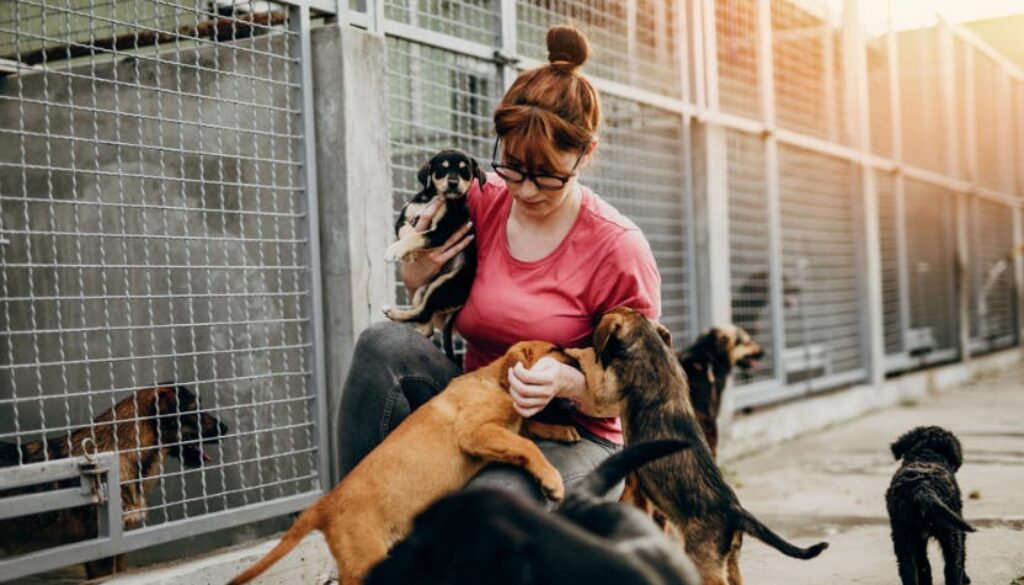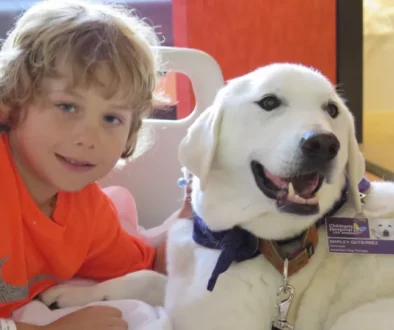Volunteering at Animal Shelters: Giving Back to Our Furry Friends
Animal shelters play a vital role in our society by providing temporary homes and care for animals in need. These shelters rely on dedicated volunteers to help them fulfill their mission of ensuring well-being and finding forever homes for these animals. Volunteering at animal shelters not only benefits the shelter and the animals but also offers numerous rewards for the volunteers themselves.
In this article, we will explore the importance of volunteering at animal shelters, the various types of volunteer work available, how to get involved, and the impact it has on the animals and the community.
Importance of Animal Shelters and the Need for Volunteers
Animal shelters serve as a safe haven for stray, abandoned, or surrendered animals. They provide medical attention, food, shelter, and a chance for adoption to animals in need. However, the overwhelming number of animals requiring care surpasses the resources of these shelters. This is where volunteers come in to make a significant difference. By volunteering their time and skills, individuals can contribute to alleviating the burden on animal shelters and improving the lives of these furry friends.
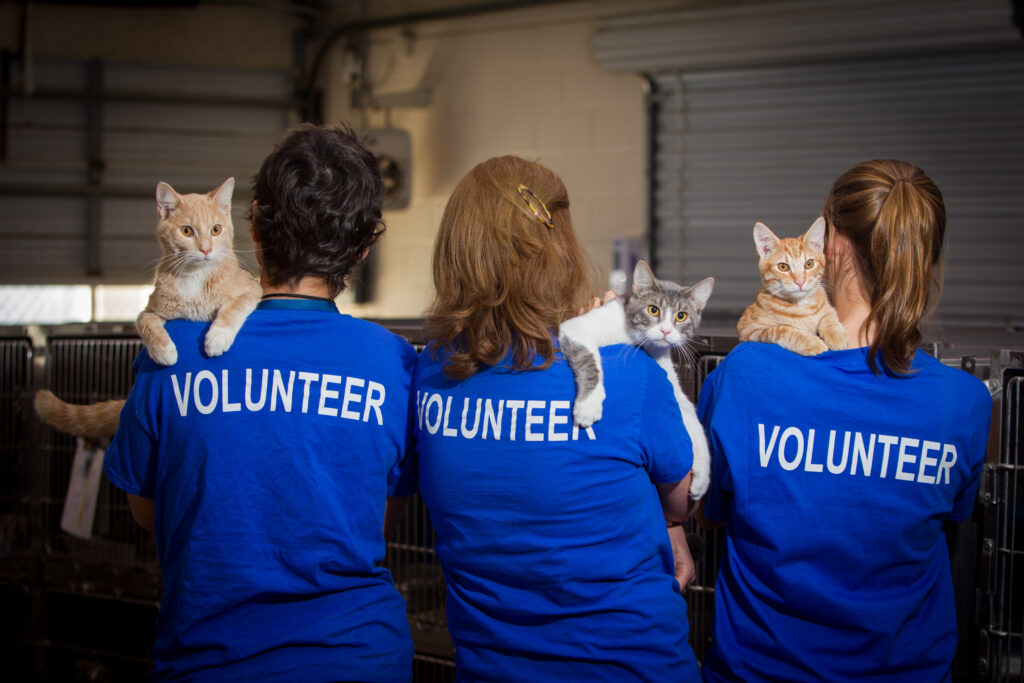
Benefits of Volunteering at Animal Shelters
Volunteering at animal shelters offers countless benefits to individuals who are passionate about animal welfare. Not only does it provide an opportunity to give back to the community, but it also has a positive impact on the volunteer’s emotional and mental well-being.
Emotional and Mental Well-being
Interacting with animals and seeing their resilience and capacity for love can have a remarkable effect on a person’s emotional and mental well-being. Animal shelters provide a therapeutic environment where volunteers can experience happiness, joy, and a sense of purpose while helping these animals overcome their challenging circumstances.
Opportunity to Make a Difference in Animals’ Lives
Volunteers play a crucial role in ensuring that the animals receive the care, attention, and love they need. By spending time with them, volunteers provide essential socialization, exercise, and enrichment opportunities, making a significant difference in their lives and increasing their chances of finding loving forever homes.
Development of Skills and Personal Growth
Volunteering at animal shelters allows individuals to develop a wide range of skills, such as animal handling, grooming, and behavior assessment. These skills can be invaluable for people considering a career in animal-related fields or simply looking to enhance their knowledge and abilities. Moreover, volunteering often fosters personal growth by teaching compassion, empathy, and responsibility.
Types of Volunteer Work at Animal Shelters
Animal shelters require help in various areas to ensure the smooth functioning of their operations. Volunteers have the flexibility to choose tasks that match their interests, skills, and availability. The following are some common types of volunteer work at animal shelters:
Animal Care and Socialization
One of the primary responsibilities of volunteers at animal shelters is to provide basic care and socialization for the animals. This includes tasks such as feeding, grooming, and walking dogs, as well as cleaning and maintaining their living spaces. Volunteers also spend quality time playing with cats and providing them with affection and attention.
Cleaning and Maintenance Tasks
Volunteers assist in maintaining a clean and hygienic environment for the animals by cleaning kennels, litter boxes, and other areas. This ensures that the animals live in safe and healthy conditions. Volunteers may also help with laundry, dishwashing, and other essential chores to support the overall cleanliness of the shelter.
Administrative and Fundraising Support
Animal shelters often rely on volunteers to help with administrative tasks, such as answering phones, filing paperwork, and organizing records. Additionally, volunteers may participate in fundraising events and support shelter initiatives by raising awareness and gathering donations.
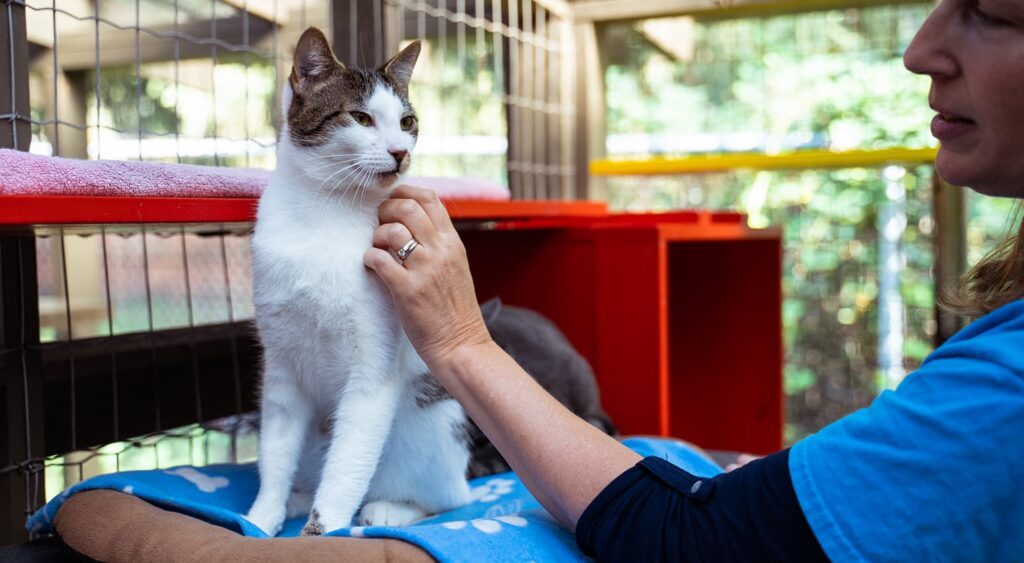
How to Get Involved as a Volunteer
Getting involved as an animal shelter volunteer is a straightforward process that requires a few essential steps. Following these steps will ensure a smooth integration into the shelter’s volunteer program:
Research Local Animal Shelters
Start by researching animal shelters in your area. Look for reputable shelters that align with your values and interests. Read reviews, visit their websites, and understand their mission and philosophy. Consider factors such as the type of animals they care for, the services they provide, and the volunteer opportunities they offer.
Understand Volunteer Requirements and Expectations
Once you have identified a potential shelter, familiarize yourself with their volunteer requirements and expectations. This includes age restrictions, time commitments, training prerequisites, and any other specific qualifications they may have. Ensure that you meet the necessary criteria before proceeding with the application process.
Complete Application and Orientation Process
Next, complete the volunteer application provided by the animal shelter. This typically includes personal information, availability, and areas of interest. After submitting your application, you may be invited to attend an orientation session where you will learn about the shelter’s policies, procedures, and safety protocols. Take this opportunity to ask any questions you may have and gain a comprehensive understanding of your role as a volunteer.
A Typical Day as an Animal Shelter Volunteer
A typical day as an animal shelter volunteer can be filled with a variety of tasks and responsibilities. Every day is different, but here is an overview of what you can expect as a volunteer:
Morning Duties: Feeding and Cleaning
Mornings at the shelter usually involve feeding the animals and providing them with fresh water. Volunteers take care to ensure that each animal receives the appropriate diet and portion sizes. After feeding, cleaning, and maintaining the animals’ living spaces follow. This includes tidying up kennels, refreshing litter boxes, and replenishing bedding materials.
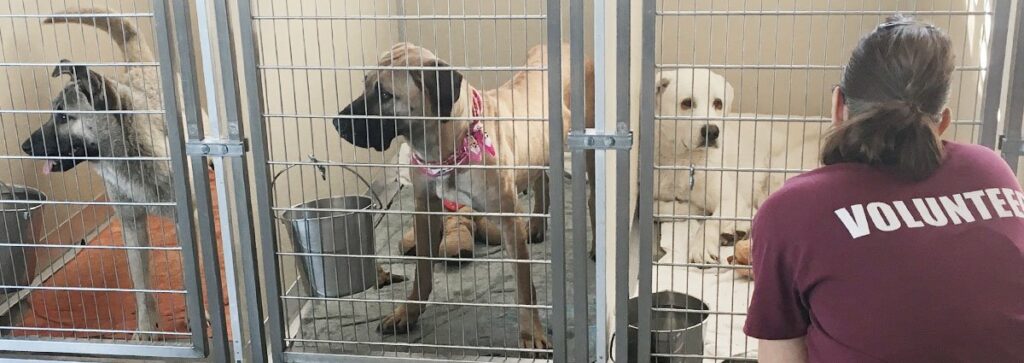
Interaction and Enrichment Activities with Animals
Once the basic chores are complete, volunteers have the opportunity to spend quality time with the animals. This may involve taking dogs for walks, playing with cats using toys and interactive games, or simply sitting quietly and offering comfort to the animals. Volunteers engage in socialization activities tailored to the unique needs and personalities of each animal, ensuring they receive individual attention and love.
Assisting with Adoption Events and Outreach Programs
Some volunteers may have the opportunity to participate in adoption events or assist with outreach programs organized by the shelter. Adoption events provide potential adopters with the chance to meet and interact with the animals, while outreach programs involve educational initiatives and community engagement. Volunteers play an essential role in facilitating these events, helping potential adopters find their perfect furry companion, and spreading awareness about responsible pet ownership.
Challenges and Rewards of Volunteering
Volunteering at animal shelters can be emotionally challenging, but the rewards far outweigh the difficulties. It is essential to understand the potential challenges and how to overcome them:
Dealing with Loss and Emotional Challenges
One of the most significant challenges of volunteering at an animal shelter is dealing with loss. Some animals may face severe health issues or may not find a forever home despite the shelter’s best efforts. This can be heartbreaking for volunteers who have grown attached to these animals. It is important to have a support network, both within the shelter and outside, to cope with these emotional challenges and find ways to heal.
Witnessing Animals’ Transformations and Successful Adoptions
While there are emotional challenges, the rewarding moments make it all worthwhile. Volunteers often witness incredible transformations in animals, seeing them regain their health, confidence, and trust in humans. The joy of seeing animals find their forever homes, knowing that you played a part in their journey, is incredibly gratifying and serves as a reminder of the positive impact volunteering can have.
Building Strong Relationships with Fellow Volunteers and Shelter Staff
Volunteering at an animal shelter fosters a sense of community and belonging. Volunteers get the chance to meet like-minded individuals, form meaningful friendships, and work together towards the shared goal of animal welfare. The support and camaraderie among volunteers and shelter staff can create lasting relationships and networks that extend beyond the shelter’s walls.
Impact of Volunteering on Animal Shelters and the Community
The impact of volunteering at animal shelters extends beyond the immediate care of the animals. It positively affects the shelter’s capacity and the community as a whole. Here are some key ways in which volunteering makes a difference:
Reduced Costs and Increased Capacity
Volunteers help reduce the shelter’s operating costs by providing free labor, allowing the resources to be allocated towards animal care and essential programs. Additionally, volunteers enable animal shelters to expand their capacity by taking on tasks that would otherwise require paid staff. This, in turn, enables them to help more animals in need and reach a wider audience.

Enhanced Animal Welfare and Enriched Lives
Volunteering directly enhances the welfare of animals in shelters. By providing them with companionship, socialization, and enrichment, volunteers improve their mental well-being and increase their chances of adoption. The dedication and passion of volunteers often result in improved living conditions, better medical care, and increased efforts toward finding permanent homes for these animals.
Community Education and Awareness
Animal shelters play a vital role in educating the community about responsible pet ownership, animal welfare issues, and the importance of adoption. Volunteers act as ambassadors for the shelter’s mission, spreading awareness through their interactions with the public. By engaging in conversations and providing information at adoption events and outreach programs, volunteers inspire others to make a positive difference in the lives of animals.
Volunteering as a Family or Group
Volunteering at an animal shelter can be a rewarding experience for families or groups of friends who share a love for animals. Collaborative volunteering offers unique advantages and opportunities:
Benefits of Volunteering Together
Volunteering as a family or group allows for shared experiences and memories while contributing towards a shared cause. It strengthens the bond between family members or friends as they work towards a common goal of helping animals in need. It also provides an excellent opportunity for children to learn about compassion, responsibility, and empathy.
Bonding and Creating Meaningful Memories
Volunteering together creates lasting memories and allows family members or friends to bond over their shared love for animals. The shared experience of making a positive impact and witnessing the joy of an animal finding a loving home can be deeply rewarding and create cherished memories for years to come.
Teaching Compassion and Responsibility
Volunteering at an animal shelter offers a valuable opportunity to teach children about compassion and empathy towards animals. It helps develop a sense of responsibility as they actively participate in caring for animals and witness the impact their actions can have. These experiences can shape their values and attitudes towards animals and instill lifelong virtues.
Inspiring Volunteer Stories and Successes
Hearing inspiring stories and successes of animal shelter volunteers can be a powerful motivator for others to get involved. These heartfelt stories demonstrate the positive impact volunteers make in the lives of animals and the community:
Stories of Animals Finding Forever Homes
Volunteer efforts often lead to heartwarming success stories of animals finding their forever homes. The dedication of volunteers in providing care, love, and attention significantly increases the chances of adoption for these animals. Their tireless efforts help facilitate successful matches between deserving animals and loving adoptive families.
Personal Testimonials from Dedicated Volunteers
Volunteers themselves, driven by their passion and commitment, have their own stories to tell. Personal testimonials describe the emotional journey of being an animal shelter volunteer, the rewarding moments, the challenges faced, and the profound impact it has had on their lives. These stories serve as inspiration for others contemplating volunteering and provide invaluable insight into the volunteer experience.
Conclusion
Volunteering at animal shelters offers unique opportunities to give back to our furry friends and make a tangible difference in their lives. Beyond the immediate benefits for the animals, volunteering provides personal growth, emotional fulfillment, and the chance to be part of a passionate community dedicated to animal welfare. Whether you have a few hours to spare or are looking for a long-term commitment, your contribution as a volunteer can change the lives of animals and instill hope in their hearts. Join your local animal shelter’s volunteer program today and become a catalyst for positive change.
FAQs:
Q: Can I volunteer at an animal shelter if I have no experience with animals?
A: Absolutely! Animal shelters welcome volunteers of all experience levels. They provide training and guidance to ensure you are comfortable with the tasks assigned to you.
Q: Can I volunteer on weekends or outside regular business hours?
A: Many animal shelters have flexible volunteer schedules, including weekend and evening opportunities. Contact your local shelter to inquire about their availability.
Q: Do I need to have a certain age to volunteer at an animal shelter?
A: Age requirements for animal shelter volunteers vary by organization. Some shelters may have a minimum age requirement, while others offer family volunteering opportunities for all ages.
Q: Can I volunteer if I am allergic to animals?
A: In some cases, volunteering at an animal shelter may not be suitable for individuals with severe allergies. However, there may be other ways you can support the shelter, such as assisting with administrative tasks or fundraising.
Q: Can I adopt an animal from the shelter where I volunteer?
A: As a volunteer, you may still be eligible to adopt an animal from the shelter, provided you meet the adoption criteria. It’s best to inquire with the shelter about their specific policies regarding volunteer adoptions.
Also Read:
Pet Care Tips for Cats for Beginners
Pet Care Tips for Dogs for Beginners
